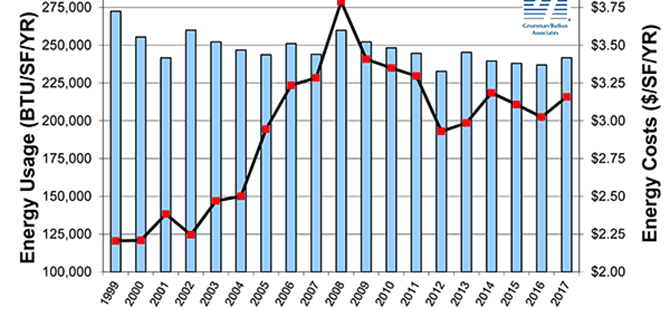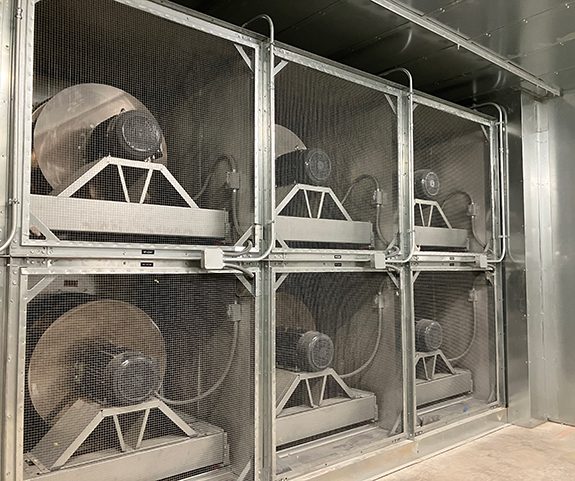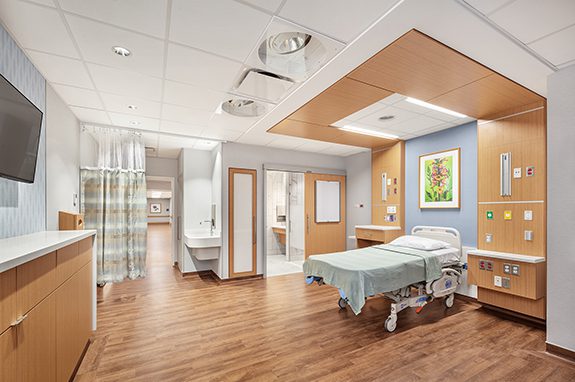Grumman/Butkus Associates has released the latest edition of its annual Hospital Energy and Water Benchmarking Survey, focusing on usage and costs for fossil fuels, electricity, and water/sewer.
The survey also tracks hospitals’ carbon footprint and energy costs per bed, all based on data submitted by participating facilties nationwide. The 2018 Edition provides information on usage trends and costs for calendar year 2017, based on data from 121 participant facilities.
Since the survey was initiated more than 20 years ago, hospitals’ overall fossil fuel use has trended downward, but electricity use isn’t declining as much. Average Btu/ft2, including both gas/steam and electricity, was 241,733 in this year’s survey, and average ft2 costs for energy were $3.16. Both numbers are up a bit compared with the prior year.
Carbon footprint results have stayed fairly steady over time, at 50 to 60 pounds of CO2 equivalent per ft2 per year. “If we are going to address the very daunting issue of climate change, the healthcare industry must make greater strides in reducing its carbon footprint,” says G/BA Chairman Dan Doyle. “As the trend data show, not enough progress is being made thus far.”
Reporting facilities displayed a broad range of usage patterns. For instance, a few participants are using more than 250,000 BTU/sf/year of fossil fuel energy, compared with the general mid-range of facilities (about 135,000 BTU/sf/year) and those that used least (75,000 BTU/sf/year or less). These variations mean that hospital fossil fuel energy costs may exceed $2.00/sf/year or come in at less than $0.50/sf/year. Simiarly, a few hospitals are consuming more than 45 kWh/sf/year ine electrical energy, compared with a mid-range of about 30 kWh/sf/year. A few respondents are squeaking by at less than 18 kWh/sf/year. Some participants are paying well over $4/sf/year for electrical energy; a few are paying less than $1.50.
“Facilities that have high unit costs for energy should view this as an opportunity,” says Doyle. “For example, an energy-improvement project that would have a five-year payback at an ‘average’ facility may have a payback of just 2.5 or 3 years at a facility with higher unit costs for energy.”
Hospitals have generally been reducing their water consumption since 2006 (about 48 gal/sf/year in 2017 compared with more than 65 gal/sf/yr in 2006). Nevertheless, these facilities generally continue to experience rising costs on a $/sf/year basis, with the pattern especially evident since 2011. Hospitals in our survey spent about $0.39 per square foot on water/sewer in 2017.
“G/BA expects the trend of rising water and sewer costs to continue,” says Doyle. “Price hikes not only reflect increasing costs to extract and treat the water, but also the fact that cash-strapped governmental entitites may view water as a revenue source.”
Among the participants in our survey, a few hospitals are using more than 100 gallons/sf/year, compared with some that use less than 25 gallons/sf/year. Differences in energy or water use among similarly sized facilities may be influenced by operating strategies. For instance, facilities that purchase steam and/or chilled water from a third party may have higher costs for both energy and water, reflecting the inclusion of labor and capital recovery in addition to raw fuel costs. (Building systems and operational choices that influence costs and usage are pointed out in G/BA’s data charts.)
The G/BA survey has provided a free annual benchmarking resource since its initial release in 1995. Hospitals are invited to participate without charge by submitting responses to a short list of questions. Information for this edition was provided by 121 hospitals located in Illinois (49), Wisconsin (25), Texas (20), Indiana (16), Louisiana (5), and several other states. G/BA is currently collecting information for the 2019 edition (2018 data).
Full results and analysis, as well as information about participating in the next survey, are available at the firm’s website. For additional information, contact Doyle (ddoyle@grummanbutkus.com) or Julie Higginbotham (jhigginbotham@grummanbutkus.com).



